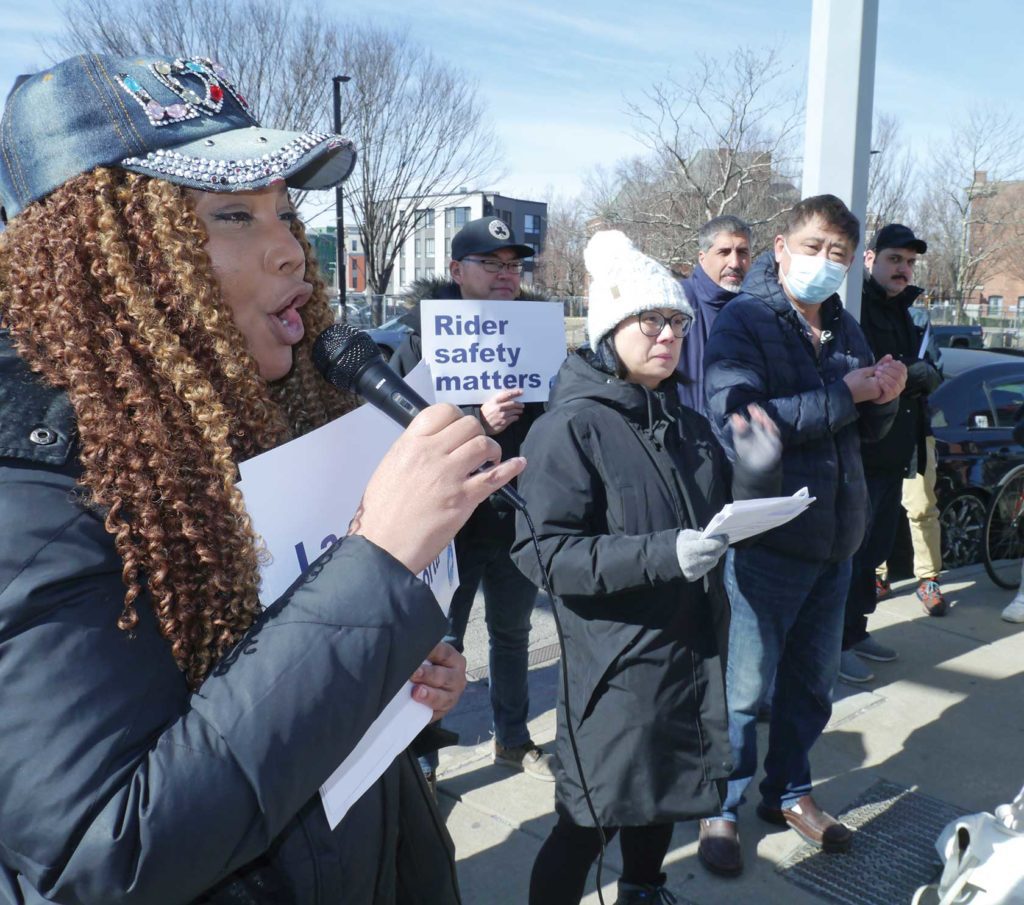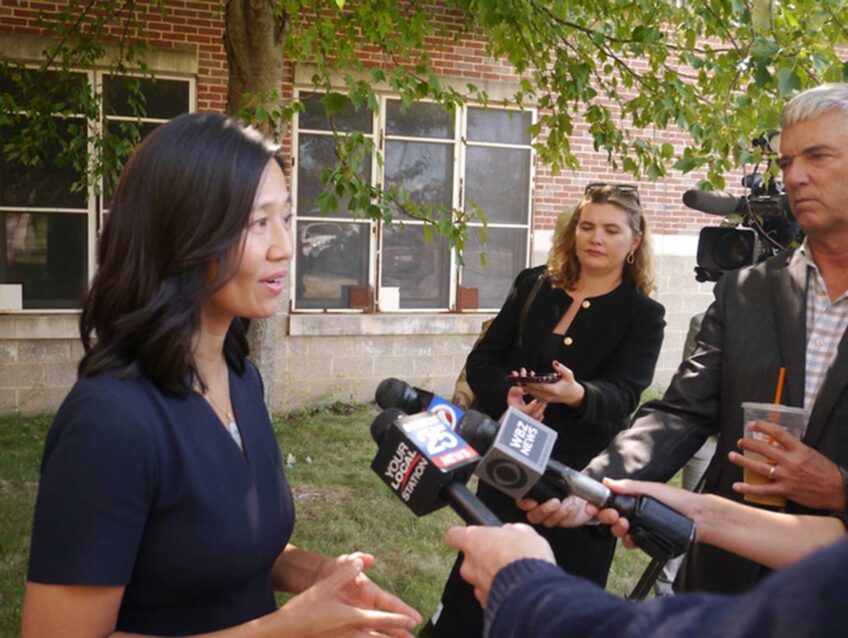
With a coalition of tech giants including Uber and Lyft dropping more than $17 million on a campaign to keep drivers classified as independent contractors, an association of drivers is teaming up with labor and community groups to marshal a statewide network of volunteers to beat the rideshare app companies.
Members of the Coalition to Protect Workers’ Rights held a series of kickoff events last Wednesday, including a stop in Nubian Square, rallying their activist bases. The campaign, which has raised just shy of $1 million, is gunning against what is shaping up to be the heaviest-spending ballot push in Massachusetts this year. Tech firms last year spent $200 million in California on a similar measure, Proposition 22, which passed with 58.6% of the vote.
Opponents of the ballot measure say they’re undeterred by the tech giants’ spending.
“They’d rather spend $100 million on lies than give the drivers protections and better pay,” said Angel Howell, an organizer with New England United for Justice. “Let’s not be fooled by their tactics. This is about the rights of workers.”
The tech giants filed the ballot question after Attorney General Maura Healey last year filed a lawsuit against them asserting that they were misclassifying as contractors drivers who worked in excess of the 30-hour-a-week threshold for full-time employment.
The tech companies’ ballot initiative, A law Defining the Contract-Based Relationship Between Network Companies and App-Based Drivers, would create a separate set of labor standards for their drivers and ensure that the drivers are not classified as full-time employees, which would require benefits such as paid sick time, health insurance and Workers’ Compensation.
Their campaign, called Flexibility and Benefits for Massachusetts Drivers, has commissioned two studies, one finding that a majority of app-based drivers would prefer to remain contractors, and another finding that classifying drivers as full-time employees would result in the loss of 87% of rideshare and delivery jobs in the state.
Labor activists questioned the validity of these studies and point to a UC Berkley Labor Center study that found that the tech giants’ ballot question would codify in law a system where drivers would receive as little as $4.82 an hour. Drivers are paid for the time when they have a fare, but not for the time they wait for fares, which, according to data from Uber is more than one-third of their time. Drivers are also compensated for mileage at a rate of 26 cents per mile, far less than the IRS standard mileage reimbursement rate of 56 cents per mile. Drivers are also not compensated for the miles they travel between fares.
Beth Griffith, the executive director of the Boston Independent Drivers Guild, said driving for the rideshare firms has already become less profitable, pointing to what she says were five pay cuts Lyft drivers have faced in recent years, bringing the pay-per-mile rate for cars rented through the firm down from 66 cents to 38 cents.
“Sometimes, you barely make enough money to cover the rental,” she said. “The morale is down. A lot of drivers have quit.”
While the firms attract new drivers with bonuses up to $2,000, Griffith said the rideshare apps string drivers along.
“It’s an algorithm that’s designed to keep you on the app for a maximum amount of time while making a minimum amount of money.”
Tech firms cite driver support
Conor Yunits, a spokesman for the ballot campaign, said that during a hearing on the ballot measure last week, drivers in support of the tech firms’ ballot question outnumbered those opposed 4-to-1.
Yunits said the Flexibility and Benefits for Massachusetts Drivers campaign has a broad coalition of supporters, including 6,400 drivers who delivered a petition to the Legislature last week. Also backing the campaign are several local chambers of commerce, the Massachusetts High Technology Council and Associated Industries of Massachusetts.
Venetia Prevost, a Brookline DoorDash driver who signed the petition, said she wants to preserve her status as an independent contractor.
“Due to the fact that I’m a mom of young children and the benefits of making my own hours, that petition was in my best interests,” she said.
Prevost said she works 20 to 25 hours a week and makes between $20 and $25 an hour. DoorDash pays 10% of her gas costs charged to a company debit card.
As for wear and tear on her car?
“It’s on me,” she said. “If I want to drive all day, it’s at my discretion. It’s not DoorDash telling me I have to.”
What’s at stake
Griffith said she thinks her grassroots coalition has a good shot at beating the tech giants, despite their deep pockets.
“We’re organizing better,” she said. “We have community groups. We’re educating the public.”
While local groups such as New England United for Justice and the Greater Boston Labor Council joined the rally in Nubian Square, at the state level campaign has endorsements from U.S. Sen. Elizabeth Warren, U.S. Rep. Ayanna Pressley, the ACLU of Massachusetts, The Coalition for Social Justice, the NAACP New England Area Council and prominent labor unions, including the Massachusetts AFL-CIO.
Both the money flowing into the Flexibility and Benefits for Massachusetts Drivers campaign and the depth of the organizing in opposition speak to the national importance of the ballot measure.
“The rest of the country, the rest of the world, is looking to Massachusetts to hold the line,” said Jonathan Paz, organizing director for the opposition campaign.
Should the ballot question be defeated, it could set a dangerous precedent for the tech firms, whose business model is predicated on maintaining a workforce made up entirely of independent contractors.
Should the measure pass, it would set a dangerous precedent for workers, formalizing into law a business model in which firms externalize most of the costs of providing their service — including auto maintenance, health care and gas.
That business model rubs City Councilor Kendra Lara, self-described socialist, the wrong way.
“What we see here is another power grab by greedy corporations,” she said during last week’s rally in Nubian Square. “We’re here to tell them, ‘Not here. Not in our city.’”





